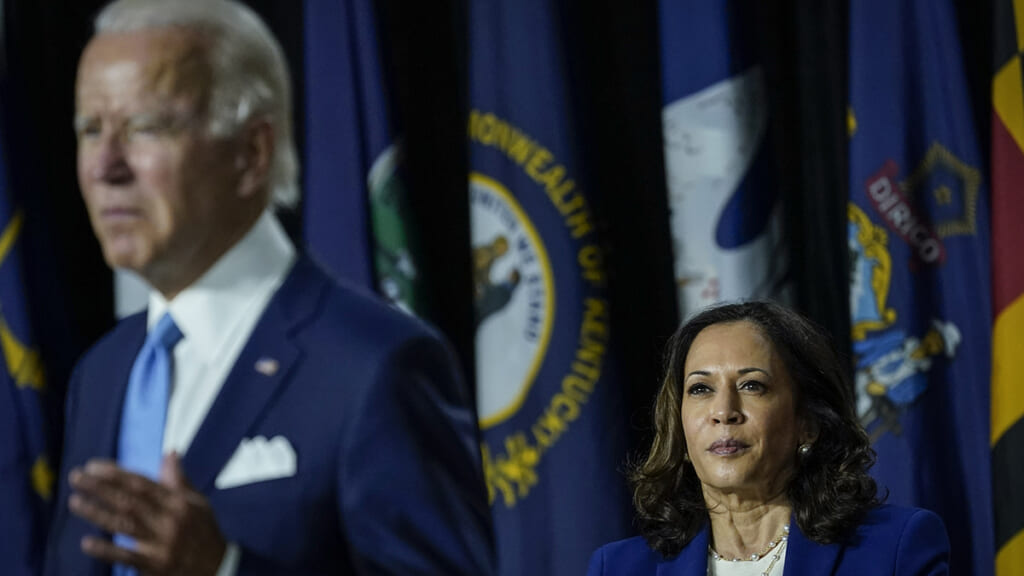Kamala Harris attacks are nothing new for Black women
OPINION: The senator's historic nomination for vice president has led to immediate and vicious criticism
From Harriet Tubman to Fannie Lou Hamer to Shirley Chisholm to Michelle Obama, America has a long history of hating, attacking and severely disrespecting any Black woman who rises to a position of power.
These attacks are often in the cross-sections of race and gender, but at times it is hard to discern when a race-neutral or gender-neutral attack is shaped by racial or gender bias.
Senator Kamala Harris’s historic nomination for vice president led to immediate and vicious criticism, and we all know it is only the beginning. The attacks are personal to her, but for many Black women, the strikes are a variation of the attacks we have all experienced.
Read More: Amazon takes down ‘Joe and the Hoe’ shirts belittling Kamala Harris
Some of the attacks are racist, like the birtherism attack or arguments that she is not African-American. Some of the attacks are sexist, like President Trump immediately calling Harris “extraordinarily nasty” or a senior legal adviser to the Trump campaign, posting “Kamala sounds like Marge Simpson.” Some of the attacks are both racist and sexist, like a Virginia mayor comparing her to Aunt Jemima or folks insisting she was chosen because “she’s a Black, she’s a female.”

Some of the attacks appear devoid of race and gender, but a closer look reveals they are based on negative stereotypes and implicit biases against women leaders of color, and specifically Black women leaders. The attacks questioning Harris’s credibility, calling her untrustworthy, questioning her qualifications, and one-liners simply reducing her to “a cop” or “too radical” do not fall in a clear camp on the surface, but a deeper examination reveals these types of attacks — simplifications, reductive narratives and credibility attacks — are disproportionately brought against women of color.
Researchers have found that due to the intersection of race and gender, women of color leaders “experience racial and sexual stereotyping, token status, inaccurate assessment of work productivity, and unrealistic expectations that mitigate against the attainment of higher level positions.” They report greater isolation and difficulty being perceived as credible.
Earlier this summer, the American Bar Association released a report on senior women of color in the legal profession. Women of color expressed having to prove themselves over and over again and being held to a different standard than their male and white peers.
Last year, the Building Movement Project conducted a study focusing on women of color in the non-profit sector and found similar results: “several women of color described the discomfort of intense and constant scrutiny about their presence and their capabilities, and being persistently stereotyped as unqualified, inexperienced, or unskilled.”
Read More: Kamala Harris cartoon in Murdoch newspaper declared ‘racist’

Erika Stallings, a Black woman, recently recalled an incident in The Cut where a partner at her law firm, who she had little interaction with, gave her an unprompted extremely negative review. Despite her multiple strong performance reviews, her annual review process focused on the negative review. She later found out this middle-aged white male partner had a record of negative interactions with other Black colleagues.
Attacks on Harris’s credibility and qualifications are something Black women are all too familiar with. We know we are often held to a different set of standards than our male or white colleagues and peers. We know we are often made to feel invisible until we are hyper-visible and heavily scrutinized. We know we are often criticized in a seemingly neutral manner, but with a racist, sexist root.
It’s easy to blame these attacks on Harris on a racial reckoning, an inspired progressive left, a global pandemic, or the reality of Trump’s America. But dismissing the attacks on Harris and attributing them solely to the circumstances of today erases the long history and the clear pattern of our country’s attack against powerful Black women. Misogynoir has always followed powerful Black women.

Harris has been an elected official for over 15 years and started her career working in our racist criminal justice system. We must be able to discuss her past without racist and sexist bigotry seeping into our discussions.
Recognizing the nuanced and complex ways Black women leaders are undermined does not mean we cannot present real concerns and questions about Harris’s policy and past positions. Instead, acknowledging stereotypes and tropes forces us to think critically about how we frame such questions and to have an open dialogue about what standards we want to hold all of our elected officials to.
America has much to gain from Harris’s nomination. In addition to her professional experience and qualifications and her monumental nomination, Americans are going to get a master class in what resilience looks like. In the center of the national spotlight, Harris will overcome constant indignities, microaggressions, and credibility attacks while exhibiting unwavering strength and grace.
Americans are going to better understand why Black women are often called strong (sometimes to our detriment). Michelle Obama gave us a glimpse of it as first lady, Rep. Maxine Waters, Cook County State’s Attorney Kimberly Foxx, and Atlanta Mayor Keisha Lance Bottoms of Georgia, provide us with a peek once in a while.
For the next 3 months, Senator Kamala Harris is going to provide us with a close-up case study.
Nonny Onyekweli is a lawyer in New York.
Have you subscribed to theGrio’s podcast “Dear Culture”? Download our newest episodes now!
